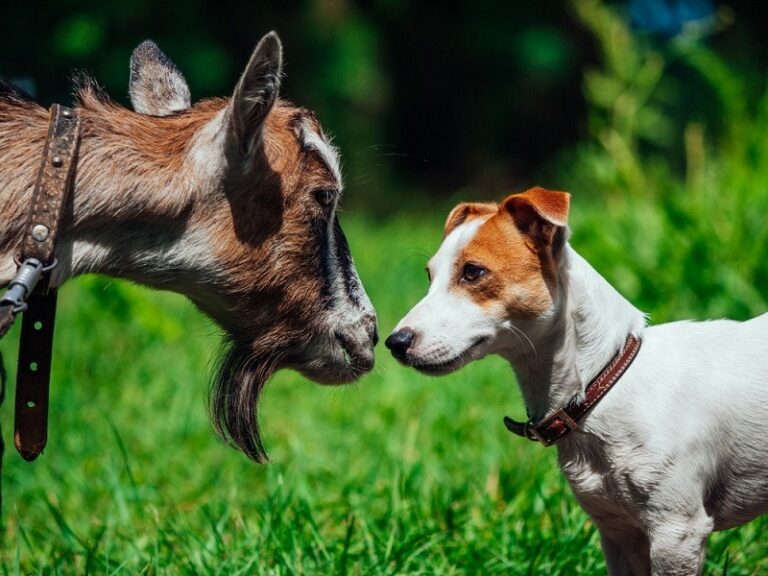There are many people who promote raw diets for dogs, and you may see raw goat milk as an important part of the diet. But is goat’s milk safe (raw or pasteurized) for your beloved pet?
Although goat’s milk took a long time to become popular in the United States, this rich and slightly sweet milk has enjoyed worldwide popularity for many years. Because it is richer in fat and protein than cow’s milk, goat’s milk is very popular with dog breeders.
Undiluted goat milk is a good option for puppies that need extra feeding but have trouble digesting large fat globules from cow milk.
CONTENT:
- Raw goat milk for dogs or pasteurized?
- The benefits of goat milk for dogs
- Is goat’s milk safe for puppies and adult dogs?
- Food tips for the administration of goat milk for dogs
- Weaning a puppy fed with goat milk
- Risks and precautions
Raw goat milk for dogs or pasteurized?
When milk is collected from goats, it is in its natural, raw state. This raw goat’s milk contains a lot of valuable vitamins, minerals, enzymes, proteins, fatty acids, probiotics, and electrolytes. Many people prefer to drink raw milk because of all these benefits.
But milk that does not come from healthy animals or milk that is not obtained from a clean plant with proper cleaning procedures can be contaminated with bacteria. Due to the possibility of contamination and the prevalence of isolating dairy products, much of America’s milk is pasteurized.
Pasteurization is designed to kill any potential pathogens that have infected the milk. Unfortunately, it also removes many of the healthy enzymes and probiotics that are sensitive to heat and are therefore destroyed by the pasteurization process.
If you choose to feed your dogs goat’s milk, make sure you know the source of the milk. Raw goat’s milk from healthy animals can add a lot of nutrition to your pet’s diet. But if you do not know the source of the milk or question the sanitizing methods used, pasteurized milk could be a better alternative.
The benefits of goat milk for dogs
- Goat milk is richer in nutrients
Some studies have shown that goat’s milk is richer in essential fatty acids (such as linoleic and arachidonic acid), vitamin B6, vitamin A, niacin, selenium, calcium, magnesium, and potassium.
- It is naturally homogenized
All types of milk contain fat globules. Goat milk fat cells are much fewer than cow’s milk, and also do not contain agglutinin.
Homogenization mechanically breaks down the walls of fat cells, thus preventing fat molecules from clumping together and growing.
When homogenization breaks down the cell wall, xanthine oxidase (a free radical) is released. Free radicals can adversely affect your pet’s health. Because of this potential threat, goat milk may be a healthier option than homogenized cow’s milk.
- Goat milk is easier to digest
Smaller fat globules in goat’s milk make it easier to digest, as your pet’s digestive enzymes can break down a smaller fat globule more easily than a larger one.
Is goat’s milk safe for puppies and adult dogs?
Newborn puppies should always be fed with their mother’s milk. But sometimes the puppies are orphaned or their mother simply does not produce enough milk.
Supplementing your puppy with goat milk as it grows will add healthy nutrients to your puppy’s diet.
Once your puppy is mature, goat’s milk has vitamins and minerals that dogs can use to maintain good health when used as part of a balanced diet. Remember that as dogs go through the puppy phase, they produce less lactase. Beware of lactose intolerance symptoms (gas, bloating, diarrhea)
Food tips for the administration of goat milk for dogs
For additional feeding purposes, buy goat’s milk that should be stored in the boiling process and not in fresh form. Add some corn syrup to the milk to make it more palatable and to increase the calories. If the formula is the only source of nutrition for the puppy, it is recommended to mix the milk with an egg yolk for extra protein.
As with human infant formulas, the formula for goat milk for dogs should be warmed to body temperature: 95 to 100 degrees Fahrenheit (35 ° – 38 ° C) in canines.
Weaning a puppy fed with goat milk
If a formula based on goat’s milk is your puppy’s main food source. You can start weaning the puppy when it is about 1 month old. Mix small amounts of dog food with formula or water to make a thin porridge and allow it to stick to the tongue.
Gradually reduce the amount of mixture and add small amounts of solid food until the dog is fully connected to the solid food for the puppies. Once this process is complete, stop feeding the puppy goat’s milk.
Risks and precautions
Adult dogs do not have enough lactase in their digestive system to properly break down lactose from milk. Although goat’s milk is slightly lower in lactose than cow’s milk, it is not yet recommended for adult dogs, as it can cause stomach irritation and diarrhea.

